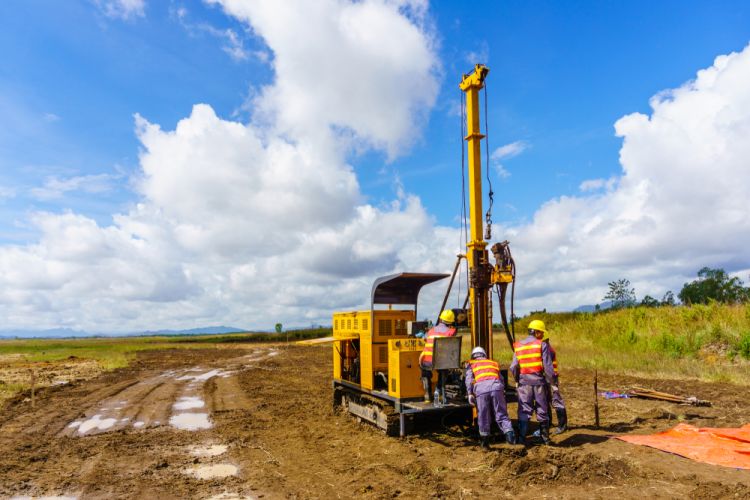7 Simple Techniques For Specialized Geotechnical Engineering Solutions
7 Simple Techniques For Specialized Geotechnical Engineering Solutions
Blog Article
All About Specialized Geotechnical Engineering Solutions
Table of ContentsNot known Details About Specialized Geotechnical Engineering Solutions Not known Facts About Specialized Geotechnical Engineering SolutionsLittle Known Questions About Specialized Geotechnical Engineering Solutions.All About Specialized Geotechnical Engineering Solutions
They conduct site investigations, gather examples, perform lab tests, and assess data to review the viability of the ground for building and construction projects. Based upon their searchings for, geotechnical designers supply recommendations for foundation style, incline stability, preserving structures, and mitigation of geotechnical dangers. They team up with various other experts, such as engineers, architectural engineers, and construction teams, to guarantee that geotechnical factors to consider are integrated into the general task layout and application.
Structure Design: Geotechnical engineers play a crucial duty in designing foundations that can safely support the designated structure. They examine the dirt problems and lots requirements to figure out the suitable structure kind, such as superficial structures (e.g., footings), deep structures (e.g., heaps), or specialized strategies like dirt enhancement. They take into consideration aspects such as settlement restrictions, bearing capacity, and soil-structure interaction to create optimum structure layouts.
Everything about Specialized Geotechnical Engineering Solutions
Here are some kinds of geotechnical designers: Foundation Designer: Structure engineers concentrate on creating and assessing structures for structures - Specialized Geotechnical Engineering Solutions. They assess the soil problems, tons demands, and website attributes to identify one of the most ideal foundation kind and style, such as shallow foundations, deep foundations, or specialized strategies like stack structures
They do area testing, collect examples, and evaluate the accumulated data to characterize the dirt residential or commercial properties, geologic developments, and groundwater conditions at a site. Geotechnical Instrumentation Engineer: Geotechnical instrumentation designers focus on surveillance and determining the actions of dirt, rock, and structures. They set up and preserve instrumentation systems that monitor elements such as dirt settlement, groundwater degrees, incline movements, and architectural displacements to examine efficiency and offer very early warnings of possible issues.
In the workplace setting, geotechnical engineers use specialized software application devices to perform computations, develop designs, and examine data. Specialized Geotechnical Engineering Solutions. They prepare records, evaluation task specifications, interact with clients and team participants, and coordinate project tasks. The workplace setup gives a favorable setting for research study, evaluation, and collaboration with other specialists associated with the project
They often check out project sites to carry out website examinations, analyze geotechnical conditions, and gather information for evaluation. These gos to include traveling to different areas, sometimes in remote or challenging terrains. Geotechnical engineers may carry out dirt tasting, conduct examinations, and display building and construction tasks here are the findings to ensure that the geotechnical elements of the task are being applied appropriately.
A Biased View of Specialized Geotechnical Engineering Solutions
Geotechnical designers likewise operate in specialized geotechnical labs. In these centers, they perform experiments, do tests on dirt and rock examples, and evaluate the design properties of the products. Geotechnical lab engineers function extensively in these settings, taking care of testing tools, operating tools, and taping information. They collaborate with various other laboratory team to guarantee exact and reputable testing outcomes.
Preserving Walls: Creating wall surfaces that hold back dirt to prevent landslides and supply security on sloped surfaces. Embankments official site and Earthworks: Creating embankments for roads, trains, and dams to guarantee they remain steady under tension. The mining sector relies heavily on geotechnical design to ensure the safety and long life of its operations.
With this in mind, we have actually created our program to prepare pupils for success. Geotechnical engineers are involved in all stages of the style of structures, from concept to construction. Their job is crucial in the layout and planning procedure as they analyze the stability of soil, clay, silt, sand, and rock, prior to construction starting.
Rumored Buzz on Specialized Geotechnical Engineering Solutions
This is followed by a ground examination based upon the findings of the desk research and involves trial matching and tasting to uncover any type of prospective concerns. Geotechnical engineers work within multidisciplinary groups, sustained by intermediate and junior designers as well as by CAD professionals. As an elderly geotechnical engineer on a hydro plant job, jobs may consist of joining technical evaluations (e.g., peer testimonials), tailings clog inspections, dam security evaluations, and various other researches related to the design Learn More and building of mine waste centers.
While some professionals specialise solely in geotechnics, others may work under titles like design geologist or ground designer within similar capacities. As a geotechnical designer, you'll need to: build and keep partnerships with clients and various other professionals involved in the site, throughout each projectmaintain safety and security standards on website be conscious of expense effects when you make recommendationsstudy geological maps and airborne pictures from an array of resources and from various time periodsexamine building intends to see just how practical they are based upon your understanding of the siteinvestigate dangers or geological risks for the sitesearch for ecologically delicate attributes, such as land fill begin to establish factual and interpretive ground modelsplan area investigationsdrill and analyse examples of bedrock, dirt, groundwater and added products supervise other professionals on sitesolve technical problems as they emerge, such as unanticipated structures at drill sitesmonitor conditions throughout and after building and construction to make certain frameworks are secure in the short and long termadd information gathered on website to your first researchcreate geotechnical estimations, drawings, and two or three-dimensional computer system designs interpreting the datamake suggestions about the proposed use the site.
There are lots of possibilities to satisfy brand-new individuals, as you'll work with a series of experts at every site. The work can be demanding as you may be responsible for the safety and security of others while on site. There is additionally a high level of monetary responsibility, as the referrals you make can have severe cost ramifications.

Report this page